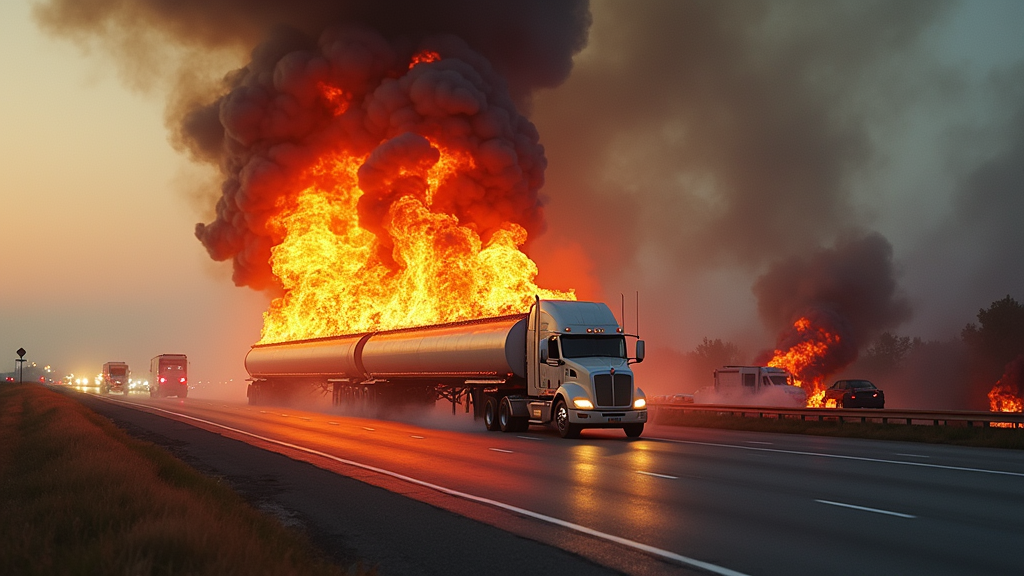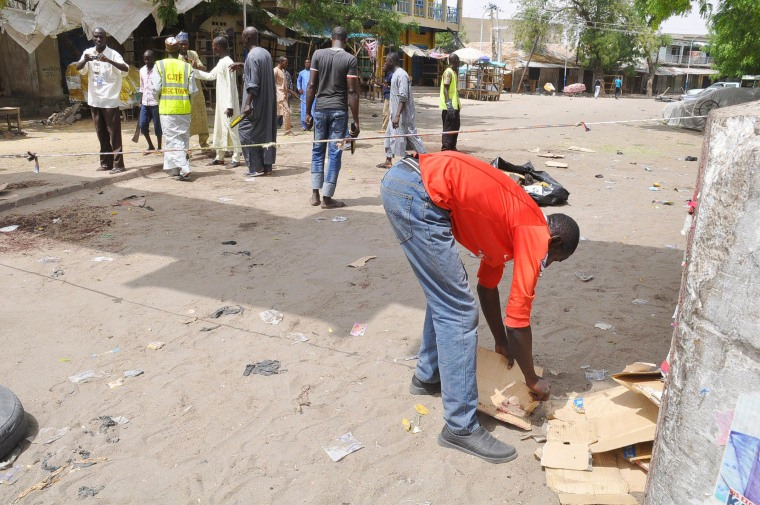In a shocking turn of events, a fuel tanker explosion in Kwara has left many passengers feared dead, highlighting the severe dangers of fuel transportation in Nigeria. On Friday morning, the incident occurred in Ilorin, the capital of Kwara State, sending shockwaves through the community and drawing attention from local news outlets. Eyewitness reports describe a terrifying scene in the Iyemanja community along the expressway, where flames engulfed vehicles and trapped individuals inside. This tragic event is not an isolated incident, as fuel tanker accidents in Nigeria have become alarmingly frequent, raising concerns about highway safety and emergency response protocols. As the investigation unfolds, the Kwara tanker explosion serves as a painful reminder of the urgent need for stricter regulations to prevent such catastrophic occurrences in the future.
The recent explosion involving a fuel tanker in Kwara has sparked widespread concern, as it underscores ongoing issues related to fuel-related disasters on Nigerian highways. Reports from Ilorin indicate a devastating scene, where a large fire has engulfed multiple vehicles, trapping many within them. This tragic event is part of a worrying trend of fuel tanker incidents across Nigeria, where inadequate safety measures have led to significant loss of life and property. The urgency for a robust emergency response to fuel explosions is critical, especially as motorists continue to face perilous conditions on the roads. As authorities grapple with the aftermath, the focus must shift to improving safety standards and prevention strategies to protect lives.
Understanding the Recent Fuel Tanker Explosion in Kwara
On February 28, 2025, a tragic fuel tanker explosion occurred in Ilorin, Kwara State, claiming the lives of numerous passengers. Eyewitness accounts from locals, including a harrowing live video, revealed the intensity of the fire that engulfed vehicles in the Iyemanja community. Many were trapped inside their cars, unable to escape as flames rapidly spread. This incident highlights the urgent need for improved highway safety measures in Nigeria, particularly concerning the transportation of hazardous materials such as fuel.
The Kwara tanker explosion raises significant concerns regarding emergency response times and the effectiveness of safety protocols in place for fuel tankers. With multiple incidents occurring in recent months across Nigeria, including a catastrophic explosion in Niger State, it is evident that systemic issues contribute to these tragedies. The government must prioritize the development of comprehensive safety regulations and emergency response strategies to mitigate the risk of future fuel tanker accidents.
The Impact of Fuel Tanker Accidents on Nigerian Highways
Fuel tanker accidents have become a grim reality on Nigerian highways, with the recent explosion in Kwara serving as a stark reminder of the potential dangers. Poor road conditions, reckless driving, and the lack of stringent safety regulations have all contributed to an alarming frequency of such incidents. The high volume of fuel tankers on the roads increases the risk of accidents, especially in crowded areas where traffic congestion is common. This situation demands immediate attention from authorities to enhance road safety for all users.
Moreover, the aftermath of fuel tanker accidents often leads to devastating consequences, including loss of life and severe injuries. The explosions not only endanger passengers but also threaten surrounding communities and properties. As witnessed during the Kwara incident, the flames can spread rapidly, posing risks to other vehicles nearby. This highlights the critical need for improved emergency response mechanisms and public awareness campaigns to educate citizens on the dangers associated with fuel tanker operations.
Emergency Response Challenges Following Fuel Explosions
Following the fuel tanker explosion in Kwara, many have raised concerns about the effectiveness of emergency response efforts in Nigeria. Eyewitnesses reported a significant delay in responders reaching the scene, which exacerbated the situation as the fire continued to rage. This incident brings to light recurring issues within the emergency services, including inadequate resources and training to handle large-scale disasters. Ensuring prompt and effective emergency responses is essential for minimizing casualties and preventing further damage.
The need for efficient emergency response systems is particularly pressing given the increase in fuel tanker explosions across Nigeria. Authorities must invest in training programs for first responders and develop strategic response plans specific to hazardous material incidents. Additionally, collaboration with local communities to establish emergency protocols can help improve immediate responses during such crises, ultimately saving lives and protecting properties.
Preventing Future Fuel Tanker Explosions in Nigeria
To prevent future fuel tanker explosions, it is crucial for Nigerian authorities to implement stricter regulations concerning fuel transportation. This includes ensuring that all fuel tankers meet safety standards and are regularly maintained to prevent mechanical failures that could lead to accidents. Furthermore, enhancing road infrastructure and addressing the root causes of reckless driving are vital steps in reducing the frequency of these tragic incidents.
Public awareness campaigns are also essential in educating citizens about the dangers of siphoning fuel from compromised tankers, a practice that has led to numerous fatalities. Community engagement initiatives can help spread knowledge about safe practices and the importance of reporting hazardous situations to authorities. By fostering a culture of safety and responsibility, Nigeria can work towards reducing the occurrence of fuel tanker accidents and enhancing overall public safety.
The Role of Government in Ensuring Fuel Safety
The government plays a pivotal role in ensuring fuel safety across Nigeria, especially in light of recent tragic events like the Kwara tanker explosion. An urgent reassessment of current regulations governing fuel transport is needed to enhance safety measures and protect citizens. This involves not only stricter enforcement of existing laws but also the introduction of new legislation that addresses the unique challenges posed by fuel tanker operations on Nigerian highways.
In addition to regulatory measures, the government must prioritize infrastructure development to create safer roadways for fuel transport. Investments in road maintenance and safety features can significantly reduce the likelihood of accidents. Moreover, establishing a dedicated task force to oversee fuel safety regulations and emergency response procedures will ensure that the government remains proactive in preventing future disasters.
Community Response to Fuel Tanker Incidents
Community response plays a crucial role in managing the aftermath of fuel tanker incidents like the one in Kwara. Local residents often find themselves on the front lines during emergencies, attempting to assist victims while waiting for official responders. However, this can lead to dangerous situations, as seen when bystanders risk their lives to help those trapped in vehicles during the explosion. Educating communities on safe practices during such emergencies can save lives and prevent additional injuries.
Furthermore, fostering a spirit of cooperation between local authorities and communities can enhance emergency preparedness. Community workshops focused on safety protocols and first aid training can empower citizens to respond effectively in the event of a fuel tanker explosion. By building resilience within communities, Nigeria can better equip itself to handle future accidents and protect the lives of its citizens.
Learning from Past Fuel Tanker Disasters
Learning from past fuel tanker disasters is essential for preventing future tragedies in Nigeria. The recent explosion in Kwara, alongside previous incidents in Niger and Jigawa states, underscores the need for comprehensive investigations into the causes of these accidents. Analyzing factors such as road conditions, vehicle maintenance, and driver behavior can provide valuable insights into how to improve safety measures and regulations.
Additionally, sharing lessons learned from previous incidents with stakeholders, including fuel companies and regulatory bodies, can facilitate the development of best practices for fuel transportation. By fostering a culture of continuous improvement and accountability, Nigeria can work towards significantly reducing the occurrence of fuel tanker explosions and ensuring safer highways for all road users.
The Economic Impact of Fuel Tanker Explosions
The economic impact of fuel tanker explosions extends beyond immediate loss of life and property damage. Incidents like the recent explosion in Kwara can disrupt local economies, particularly in areas reliant on transportation and logistics. The destruction of vehicles and infrastructure can lead to significant financial losses for businesses and individuals, while the costs associated with emergency response and recovery efforts can strain public resources.
Moreover, frequent tanker explosions can deter investment in affected regions, as safety concerns may lead businesses to reconsider their operations in high-risk areas. To mitigate these economic repercussions, it is essential for the government to prioritize highway safety and implement effective regulations for fuel transport. By fostering a safer environment, Nigeria can promote economic stability and growth, benefiting both communities and the nation as a whole.
The Need for Comprehensive Fuel Safety Regulations
The need for comprehensive fuel safety regulations in Nigeria has never been more pressing, especially in light of the recent Kwara tanker explosion. Current regulations are often inadequate, failing to address the complexities involved in transporting hazardous materials. It is crucial for the government to collaborate with industry experts and stakeholders to develop a robust regulatory framework that ensures the safe operation of fuel tankers on Nigerian roads.
Furthermore, ongoing training and education for drivers and fuel transport companies are essential components of a comprehensive safety strategy. By implementing rigorous training programs that emphasize safe driving practices and emergency protocols, Nigeria can significantly reduce the risk of fuel tanker accidents. Ultimately, a commitment to safety and regulation will protect lives and promote a safer environment for all road users.
Frequently Asked Questions
What caused the fuel tanker explosion in Kwara?
The fuel tanker explosion in Kwara is believed to have been caused by the ignition of fuel during a tragic incident involving trapped passengers in their vehicles. The fire erupted in the Iyemanja community along the expressway in Ilorin, leading to multiple fatalities and serious injuries.
How many casualties were reported in the Kwara tanker explosion?
As of the latest updates, multiple passengers are feared dead in the Kwara tanker explosion, with the exact number of casualties still being determined as emergency responders continue to assess the scene.
What are common causes of fuel tanker accidents in Nigeria?
Fuel tanker accidents in Nigeria are often attributed to poor road conditions, reckless driving, and inadequate safety regulations. The Kwara tanker explosion is a stark reminder of these ongoing issues that frequently lead to devastating incidents.
What emergency response measures are in place for fuel explosions in Nigeria?
Emergency response for fuel explosions in Nigeria typically involves local fire services and law enforcement agencies. However, the response can be slow, as seen in the Kwara tanker explosion, where emergency responders had not arrived promptly to control the situation.
How can fuel tanker explosions be prevented in Nigeria?
Preventing fuel tanker explosions in Nigeria requires strict enforcement of safety regulations, better road infrastructure, and public awareness campaigns about the dangers of siphoning fuel from compromised tankers, especially highlighted by incidents like the Kwara tanker explosion.
What safety protocols should be followed during fuel tanker incidents?
During fuel tanker incidents, it is crucial to maintain a safe distance, avoid ignition sources, and alert emergency services immediately. The recent Kwara tanker explosion illustrates the urgent need for public education on safety protocols in such emergencies.
What has been done to improve Nigeria highway safety regarding fuel tankers?
Efforts to improve Nigeria highway safety regarding fuel tankers include calls for better regulation of tanker operations, enhancement of road conditions, and increased training for drivers. However, incidents like the Kwara tanker explosion indicate that significant improvements are still necessary.
| Key Point | Details |
|---|---|
| Incident Date | February 28, 2025 |
| Location | Ilorin, Kwara State |
| Casualties | Multiple fatalities among trapped passengers |
| Witness Account | Orioye Chanter Ijobaibile described the scene as horrific, with people trapped and burning in their vehicles. |
| Emergency Response | Emergency responders had not arrived at the scene as the fire spread. |
| Recent Similar Incidents | Similar explosions occurred in Niger State, with high fatality counts. |
| Causes of Explosions | Poor road conditions and unsafe fuel siphoning practices contribute to these tragedies. |
| Regulatory Issues | Lack of strict safety regulations for fuel transportation in Nigeria. |
Summary
The fuel tanker explosion in Kwara has tragically resulted in numerous fatalities, highlighting the ongoing dangers associated with fuel transportation in Nigeria. This incident serves as a grim reminder of the need for stringent safety regulations and emergency response protocols to prevent further tragedies on the roads.



